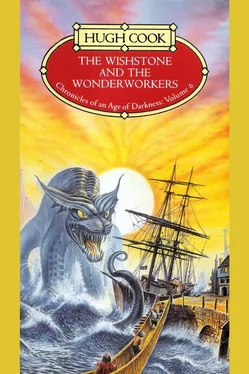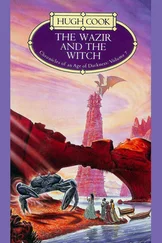Hugh Cook - The Wishstone and the Wonderworkers
Здесь есть возможность читать онлайн «Hugh Cook - The Wishstone and the Wonderworkers» весь текст электронной книги совершенно бесплатно (целиком полную версию без сокращений). В некоторых случаях можно слушать аудио, скачать через торрент в формате fb2 и присутствует краткое содержание. Жанр: Фэнтези, на английском языке. Описание произведения, (предисловие) а так же отзывы посетителей доступны на портале библиотеки ЛибКат.
- Название:The Wishstone and the Wonderworkers
- Автор:
- Жанр:
- Год:неизвестен
- ISBN:нет данных
- Рейтинг книги:4 / 5. Голосов: 1
-
Избранное:Добавить в избранное
- Отзывы:
-
Ваша оценка:
- 80
- 1
- 2
- 3
- 4
- 5
The Wishstone and the Wonderworkers: краткое содержание, описание и аннотация
Предлагаем к чтению аннотацию, описание, краткое содержание или предисловие (зависит от того, что написал сам автор книги «The Wishstone and the Wonderworkers»). Если вы не нашли необходимую информацию о книге — напишите в комментариях, мы постараемся отыскать её.
The Wishstone and the Wonderworkers — читать онлайн бесплатно полную книгу (весь текст) целиком
Ниже представлен текст книги, разбитый по страницам. Система сохранения места последней прочитанной страницы, позволяет с удобством читать онлайн бесплатно книгу «The Wishstone and the Wonderworkers», без необходимости каждый раз заново искать на чём Вы остановились. Поставьте закладку, и сможете в любой момент перейти на страницу, на которой закончили чтение.
Интервал:
Закладка:
‘The Empress, she, she might not like that,’ ventured Chegory.
‘Because what?’ said Juliet Idaho. ‘Because we’d have to wash the tablecloth afterwards? Don’t count on it, Ebby! She’s not soft in the head. Maybe I am, though, or I wouldn’t let you out of here alive. Okay. I’m letting you live. For the moment. But remember — one mistake, one finger out of line, and it’s all over. No charge, no trial, no argument. Just wwwhst!’
‘Wwwhst,’ repeated Chegory.
‘That’s right, Ebby. Wwwhst — chop! Okay, let’s get going, we’re late as it is.’
Then Juliet Idaho led young Chegory Guy from the interrogation chamber to the apartments of Justina’s major domo. There Uckermark was waiting. Like Chegory, the corpse master had been bathed, massaged, perfumed and adorned in silk.
‘So here you are!’ said Uckermark. ‘I wondered where you’d got to. Come on then. This way, this way!’
Shortly Uckermark was showing Chegory on to the long balcony which ran the length of the southern flank of the pink palace. There a number of elegant people in silk and satin were sipping at sherbet served by obsequious slaves. Sherbet was proffered to Chegory. He took it. Realised he was holding a glass of crystal worth probably more than he made in a year of rock gardening.
He sipped at the sherbet.
Tentatively.
Was it real?
Was he really here?
He was possessed of a near-unshakable sense of unreality. He could not believe that he, a common rock gardener of Ebrell Island descent, was shortly to banquet as a guest of the Empress Justina. Or that he was doomed to be slaughtered if a single move he made was misinterpreted.
Then someone tapped him on the shoulder. He turned and found himself face to face with the Empress herself. He stooped, intending to grovel at her feet, but she caught him, restrained him. Sherbet spilt all over his hands.
‘I am not who you think,’ she said.
‘You are Justina,’ said Chegory.
Already he was shaking with fear lest some move he made be misinterpreted, lest Juliet Idaho come roaring up behind him to chop off his head.
‘I am Theodora, her sister.’
‘Oh,’ said Chegory, ‘oh, I–I-’
He could see it, now. This woman was heavier of body and feature, her skin coarser, signs of her legendary abuse of her flesh already writ clear in her countenance.
‘And you?’ said Theodora. ‘You, my delightful young chevalier? Who are you?’
‘This, my lady,’ said Uckermark, intervening with a suavity one would not have expected from a mere corpse master, ‘is Chegory Guy, the guest of honour at tonight’s banquet.’
‘So,’ said Theodora. ‘So. My sister has chosen, has she? If she unchooses, then…’
She looked at Uckermark and much was exchanged between corpse master and imperial sibling in no more than a single glance. Then Theodora was moving away, hunting game not already spoken for, and a scrupulous slave was cleansing spilt sherbet from Chegory’s fingers with a piece of fine linen. Chegory’s spilt glass had already vanished, plucked neatly from his fingers by a servant so dextrous in appearance and disappearance that he was well-nigh invisible. Before Chegory could think to ask for a replacement it was in his hands already, and the slave who had cleansed those hands had conjured himself elsewhere.
‘Come,’ said Uckermark. ‘Come, let’s admire the view. It’s not often you get to see Injiltaprajura from this angle, is it?’
‘No,’ said Chegory. ‘No, it’s not.’
Chegory then allowed Uckermark to lead him to the balcony, ostensibly so they could admire the view. Was it mere accident that led the corpse master to position himself within earshot of Theodora, who was by then already in conversation with a short, determined man with a wrestler’s build? Or had he parlayed his position as some-time paramour of the Empress Justina into something more permanent? Was he her spy, informer, investigator private? Or what?
These questions must remain forever unanswered, for the corpse master was notoriously close-mouthed about his past, present and future. But the conversation between Theodora and her wrestler can be cited with total accuracy, for auditors were many, and later scandal gave all occasion to recall the interplay between Justina’s twin and the flesh of her fancy.
‘I am Troldot Turbothot,’ said he.
‘Oh,’ said Theodora. ‘And where do you hail from?’
‘From the island of Hexagon in the Central Ocean,’ said Turbothot. ‘My lord, the Baron Farouk of Hexagon, has chosen me to be the hero to circumnavigate the world.’
‘Do tell,’ said Theodora, with a delicious little simper.
Whereupon Turbothot struck a pose more fit for stage than for cocktail conversation. Then he declaimed thus:
‘Seven years ago I departed from Hexagon. I sailed west through storm and hurricane alike. Cannibal isles I landed on where men have two heads each and ride their women as horses. Gaunt cities betrayed their secrets to mine eyes. Huge towers there were of metal built, of metal empty of all but echoes. Through reefs of metal likewise did I ship, while scurvy, drought and bleeding plague did thin my crew thrice daily.
‘We ate our dead and ground their bones with wood to make our bread. Our leather then we soaked and that consumed, then ate we the canvas and the very rigging of our ship. But all came right at end, for, favoured by the weather and the gods, we dared with the dying trades to Untunchilamon’s shores. There long in the Laitemata did we linger, doomed perforce to while away the days in barter and in mercantile pursuits.
‘Then fate to the palace did then my soul compel, where there the grace of fortune did me bid face to face with that fair damsel of enchantment unsurpassed who now before me do mine eyes behold. The vision of her beauty must then my heart console when I to sea anew do take my ship. Across Moana must I dare, yea, to Ashmolea’s shores, then in despite of fear ride south to dare my ship around the southernmost point of Argan. Thus must I dare before I head my craft for home.’
So spoke Troldot Turbothot, spouting such stuff and more in effortless torrents. Injiltaprajura later learnt (when interest expressed itself in questions some of Turbothot’s crew talked) that Baron Farouk of Hexagon had exiled Turbothot for writing bad verses, for dramatising the same, and, worse, for seducing members of the Family Farouk to admiration of such dramatisation.
Farouk had framed the exile in terms of a quest impossible, but Turbothot was such a fool he had not known the questing proposition to be but a polite invitation for him to remove himself from Hexagon before the baron removed his head from his shoulders. Instead, the versifying clown had sailed to certain death, a most reluctant crew compelled by oath to join him in the venture. Yet, after seven years, some few still lived, in astonished and astonishing defiance of statistical probability.
Their story [Here the Originator of this Text yields to temptation and gives in precis the story of the voyage of Turbothot around this planetary orb on which, or so material philosophers allege, we voyage through airless wastes at a velocity at once (such are the paradoxes of this preposterous theory!) immense yet imperceptible. While the Originator’s summary thus given takes up a mere three hundred thousand words or so, it has been thought best to delete it on the grounds that most of it is a tissue of manifest lies. Turbothot claimed, for example, to have met with the ostrich, that purely mythological bird which is conjured to have the height of a man, the habits of a chicken and speed (on land, mark, for myth disclaims the power of flight for the creature!) sufficient to outpace a racing stallion. Drax Lira, Redactor Major.]
Читать дальшеИнтервал:
Закладка:
Похожие книги на «The Wishstone and the Wonderworkers»
Представляем Вашему вниманию похожие книги на «The Wishstone and the Wonderworkers» списком для выбора. Мы отобрали схожую по названию и смыслу литературу в надежде предоставить читателям больше вариантов отыскать новые, интересные, ещё непрочитанные произведения.
Обсуждение, отзывы о книге «The Wishstone and the Wonderworkers» и просто собственные мнения читателей. Оставьте ваши комментарии, напишите, что Вы думаете о произведении, его смысле или главных героях. Укажите что конкретно понравилось, а что нет, и почему Вы так считаете.












